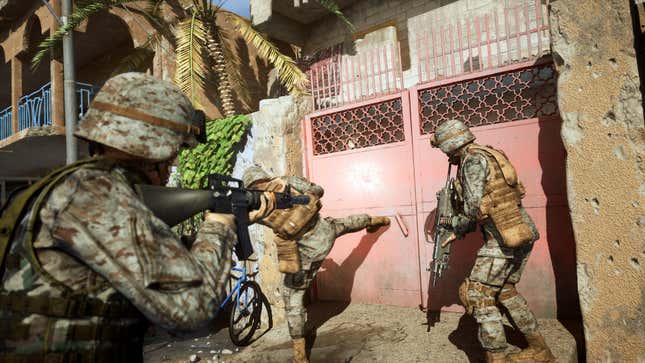
In 2009, Konami tried to release Six Days In Fallujah as an apolitical depiction of the Iraq War, before canning it when pretty much everyone said that was a bad idea. Now, with the game back from the dead, its publisher is trying to...peddle that exact same message?
The game was originally cancelled not long after Konami’s then-VP of marketing told the Wall Street Journal in April 2009, “For us, games are not just toys. At the end of the day, it’s just a game. We’re not trying to make social commentary. We’re not pro-war. We’re not trying to make people feel uncomfortable. We just want to bring a compelling entertainment experience.”
Yikes. You’d think that a decade’s worth of perspective might have changed a publisher’s view of the game and the war it was set in. Like realising how destructive the war (and the lies that led to it) has been to the Middle East and American politics; knowing there have been multiple cases involving US atrocities in Fallujah specifically; remembering the outcry from the families of soldiers killed in the war the first time this game was announced; and just generally being aware that the video game market has matured and evolved since the 2000s, and that if this game was tone-deaf in 2009, it’s a lot worse than that now.
Nope! In an interview with Polygon, Peter Tamte, from the game’s new publisher Victura, says, “For us as a team, it is really about helping players understand the complexity of urban combat. It’s about the experiences of that individual that is now there because of political decisions. And we do want to show how choices that are made by policymakers affect the choices that [a Marine] needs to make on the battlefield. Just as that [Marine] cannot second-guess the choices by the policymakers, we’re not trying to make a political commentary about whether or not the war itself was a good or a bad idea.”
He then goes on to dodge questions about the US military’s use of white phosphorous in the battle (essentially a war crime), “isn’t interested” in addressing the fact the US invaded Iraq after lying to the world about WMDs, and when asked about the choice to depict the city’s suffering in such detail says, “Almost all the outrage I’ve heard are from people who were not in Fallujah. I think we live in a culture where we feel the responsibility to defend people, whether they want to be defended or not, on social media, and I am sure that there are people who are in Fallujah who will be offended. But I will tell you that from my experience and conversations that I’ve had over 15 years on this project [...] nearly all want people to know what happened in Fallujah. Whether you are an Iraqi civilian or you are a member of the Coalition. Either side.”
OK, man. OK. The whole interview is a mess of contradictions and confused messaging that makes me wonder just why the hell they ever wanted to make this game once, let alone twice, so you should definitely go read the full thing over on Polygon.